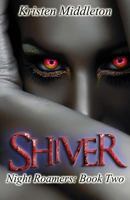Vengeance - Sete di vendetta - Vaganti della Notte libro 3
(Book #3 in the Night Roamers Series)
Select Format
Select Condition 
Based on Your Recent Browsing
Book Overview
Third Installment of Night Roamers Nikki arrives in Vegas with Ethan and Duncan to search for her family. She soon finds out that not everything is as it seems...and isn't sure of who she can trust anymore, as things begin to unfold. Meanwhile, Celeste takes advantage of the nightlife in Sin City, while joining forces with a new group of immortals, who will stop at nothing to get their hands on Nikki. This description may be from another edition of this product.
Format:Paperback
Language:English
ISBN:1492164747
ISBN13:9781492164746
Release Date:August 2013
Publisher:Createspace Independent Publishing Platform
Length:258 Pages
Weight:0.90 lbs.
Dimensions:0.5" x 5.5" x 8.5"
Customer Reviews
7 customer ratings | 5 reviews
There are currently no reviews. Be the first to review this work.
























